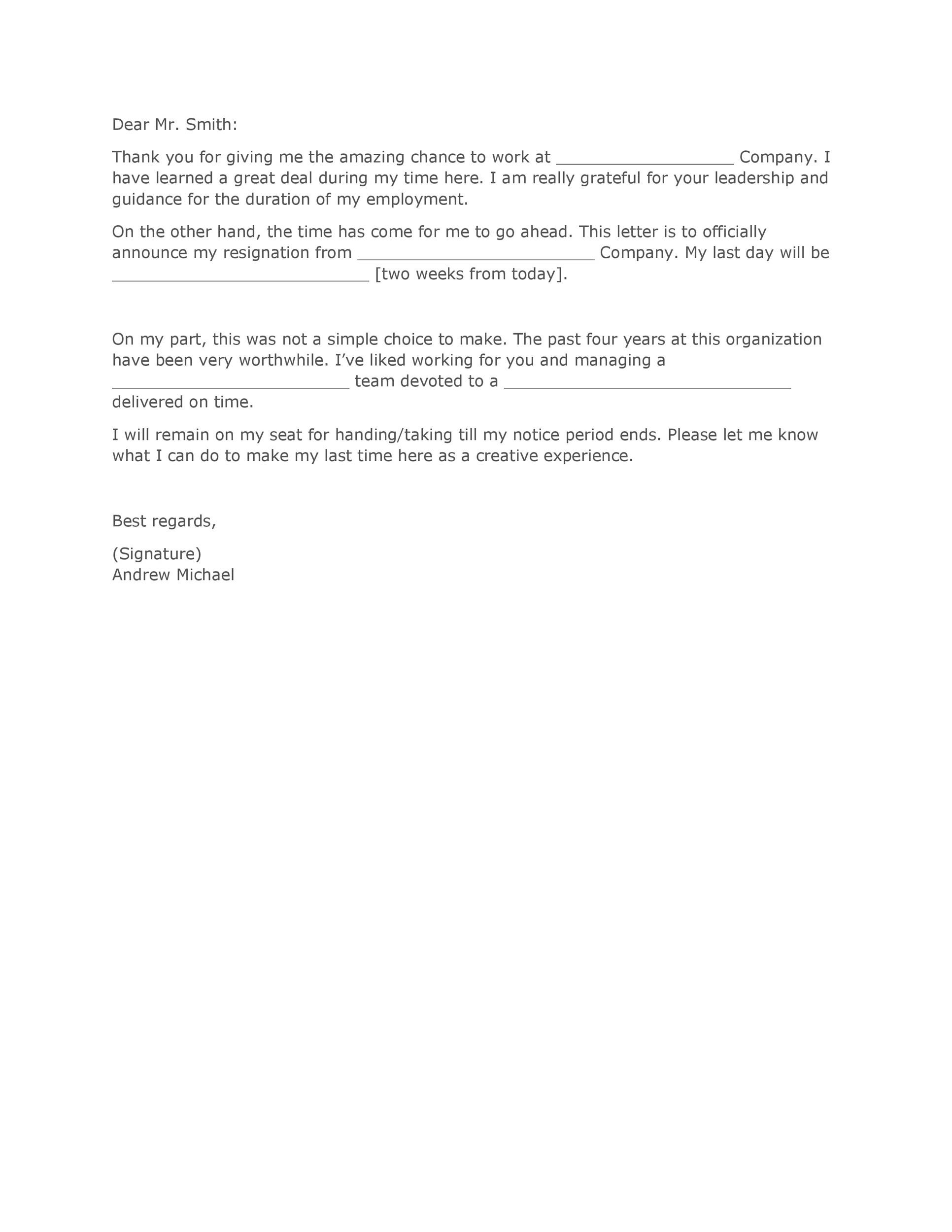When it comes to leaving a job, the way you communicate your departure can make a significant difference in your professional reputation. Submitting a proper resignation is not just about informing your employer of your intention to leave; it’s about doing so in a respectful and professional manner. A two weeks notice is a standard practice in many industries that allows both the employee and employer to prepare for the transition. This article will explore the ins and outs of providing a two weeks notice, why it matters, and how to do it effectively.
Many employees may wonder why a two weeks notice is considered the norm. This period of notice serves as a professional courtesy, giving your employer time to find a replacement or redistribute your workload. It also provides you with the opportunity to wrap up your responsibilities and leave on good terms. In an era where networking and references can play a crucial role in career advancement, how you handle your resignation can have lasting consequences.
In this comprehensive guide, we will delve into various aspects of two weeks notice, including best practices for writing your resignation letter, how to communicate your decision to your boss, and what to do during your final days at work. Whether you're leaving for a new opportunity or pursuing a different career path, understanding the nuances of a two weeks notice can help ensure a smooth transition.
What Exactly Is a 2 Weeks Notice?
A two weeks notice is a formal notification given to an employer that an employee intends to leave their position, typically effective in two weeks. While this timeframe is standard, some companies may have different policies regarding notice periods, so it’s essential to check your employee handbook or consult HR.
Why Is It Important to Give a 2 Weeks Notice?
Submitting a two weeks notice is crucial for several reasons:
- Professionalism: It reflects your professionalism and commitment to your role.
- Maintaining Relationships: Leaving on good terms can help you maintain valuable professional relationships.
- Future References: A smooth departure can lead to positive references for future jobs.
- Transition Period: It gives your employer time to prepare for your departure.
How Do You Write a 2 Weeks Notice Letter?
Writing a two weeks notice letter is straightforward. Here are the key components:
- Clear Statement: Begin with a direct statement of your resignation.
- Notice Period: Specify your last working day, which should be two weeks from the date of the letter.
- Gratitude: Express gratitude for the opportunities you had during your employment.
- Offer to Assist: Offer to help with the transition process, if possible.
What Should You Do After Giving Your 2 Weeks Notice?
After submitting your two weeks notice, it’s time to focus on your remaining time at the company. Here are some steps to take:
- Wrap Up Projects: Finish any outstanding projects or tasks to the best of your ability.
- Train Your Replacement: If applicable, assist in training a new employee or redistributing your responsibilities.
- Stay Professional: Maintain a positive attitude and professional demeanor throughout your final days.
Can You Leave Without Giving 2 Weeks Notice?
While it is possible to leave without providing a two weeks notice, doing so can have negative repercussions. Many employers view abrupt departures unfavorably, which can impact your future job prospects. However, in certain circumstances, such as personal emergencies, it may be unavoidable. If you find yourself in this situation, it’s essential to communicate openly with your employer and explain your circumstances.
What Are the Potential Consequences of Not Providing 2 Weeks Notice?
Not giving a two weeks notice can lead to several negative consequences, including:
- Damaged Relationships: You risk damaging relationships with your employer and colleagues.
- Negative References: Your employer may provide a negative reference for future job applications.
- Loss of Benefits: You may forfeit certain benefits or severance pay.
How to Handle an Exit Interview After Giving Your 2 Weeks Notice?
Many companies conduct exit interviews to understand why employees are leaving. Here are some tips on how to handle this process:
- Be Honest: Provide constructive feedback, but remain professional.
- Stay Positive: Focus on the positive experiences and lessons learned.
- Be Prepared: Anticipate questions about your departure and have thoughtful responses ready.
Conclusion: Why a 2 Weeks Notice Is Essential for Your Career?
In conclusion, providing a two weeks notice is an essential part of professional etiquette that can significantly impact your career trajectory. It demonstrates respect for your employer and colleagues, helps maintain valuable relationships, and ensures a smoother transition for everyone involved. As you navigate your career, remember that how you leave a job can be just as important as how you start one. By handling your resignation thoughtfully, you set yourself up for future success.
You Might Also Like
Unlocking The Mysteries Of Discord ID LookupExploring The Depths Of Drop D Tuning
Discovering The Mysteries: Do Sharks Sleep?
Unlocking The Joy Of Free Birthday Stuff
Unraveling The Mysteries Of The 2012 NBA Draft
Article Recommendations
- Martin Rabbett
- Td Jakes And P Diddy
- Tony Shalhoub
- Erwin Bach
- Mariah Delpercio
- Maine Cabin Masters New Season 10
- Gloria Borger Illness
- Rain Brown Net Worth
- Cancer Weekly Horoscope
- Sophierain Nudes


